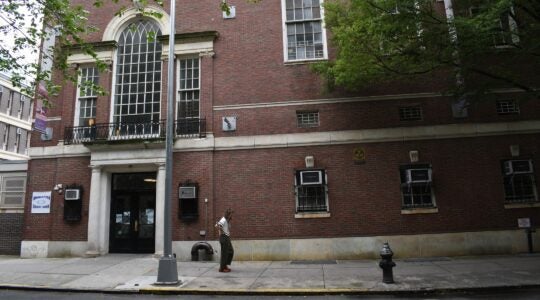More than 1,000 abandoned or neglected Jewish cemeteries in Poland would be protected from development under a proposal being considered by the Polish government, The Jewish Week has learned.
The plan calls for the creation of an international Jewish committee headed by Israel’s two chief rabbis that would identify and fence off forgotten Polish Jewish cemeteries. It would ensure that the land is not rezoned by local officials for commercial or any other purpose.
Israel’s chief rabbis would rule on all matters of Jewish law affecting the cemeteries, said Rabbi Chaskel Besser, chairman for Poland and Ukraine for the Ronald S. Lauder Foundation, who conceived the plan.
Rabbi Besser, a member of the presidium of the ultra-Orthodox advocacy group Agudath Israel of America, met Feb. 14 in Warsaw with officials of the Polish Jewish community and Polish government to unveil the proposal.
His initiative comes as a dispute continues between Polish Jewish officials and the World Jewish Restitution Organization over control of potentially hundreds of millions of dollars in Jewish communal properties seized by the Nazis during World War II. The communal assets — including synagogues, community centers and cemeteries — are being returned by the Polish government under recently passed legislation. The law does not deal with private property.
If sold, the communal properties could generate much money for Jewish efforts in Poland. But disagreement among the Jewish factions over who should control the funds has delayed the signing of a comprehensive pact.
Rabbi Besser said he wants to remove the cemeteries from the communal dispute to help resolve the communal property impasse.
Protecting Jewish cemeteries has become more acute, he said, following a recent incident in which the head of the Jewish community in Gdansk sold a portion of the local Jewish cemetery to a Norwegian gas station company.
Rabbi Besser said it is hard to say exactly how many Jewish cemeteries can be identified and protected.
“This is a very ambiguous question,” he said. “The communist government in 1984 had a list of something like 1,200, of which perhaps at that time maybe 400 were still in existence and 800 were, how shall I say, in various degrees of repair.”
Today, he said, 50 or 80 sites “are really in condition where they can be called cemeteries. The rest are the remnant of cemeteries,” overgrown unmarked fields housing scattered, broken gravestones.
The proposed deal, however, would cover all 1,200, said Rabbi Besser.
“I am trying to salvage whatever can be done,” he explained.
Many Jewish cemeteries are in the center of the city and are considered valuable real estate by local Polish officials. “If no one cares, they will be quietly sold off,” Rabbi Besser said.
His plan, which has no timetable for approval, calls for identifying the cemeteries by local zoning maps or, if none exist, by old-timers in the communities.
The draft proposal calls for the establishment of a special organization for all Jewish cemeteries headed by a paid executive. It also calls for the establishment of an advisory committee including the heads of several chasidic sects: the Gurer rebbe, Yakov Alter, and the Belzer rebbe, Yissocher Dov Rokeach, both in Jerusalem, and the Bobover rebbe, Shlomo Halberstam, in Brooklyn.
The advisory panel would include Rabbi Aba Dunner, representing the Orthodox Jewish Congregations of Europe; Rabbi Elyakim Schlesinger of London, an expert on cemetery law; and New York rabbis Mendel Reichberg and Nachman Elbaum, who have helped fund the restoration of several Polish cemeteries.
Rabbi Besser said the committee’s work should be funded partly from profits made on the sale of nonreligious communal properties.
He said that contrary to popular notion, Jewish law prohibits using even unused portions of a cemetery for other purposes.
“If it was dedicated as a cemetery, it cannot be sold,” he said. “It makes no difference whether someone was buried there.”
The New York Jewish Week brings you the stories behind the headlines, keeping you connected to Jewish life in New York. Help sustain the reporting you trust by donating today.




